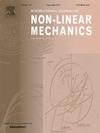Programmable mechanical metamaterials based on gear structures
IF 3.2
3区 工程技术
Q2 MECHANICS
International Journal of Non-Linear Mechanics
Pub Date : 2025-07-18
DOI:10.1016/j.ijnonlinmec.2025.105213
引用次数: 0
Abstract
The use of intelligent materials is anticipated in various fields such as medicine, science, and the military. In this context, the development of programmable metamaterials with in-situ continuously adjustable mechanical properties holds significant importance for the advancement of smart materials. Here we propose a novel approach to constructing mechanical metamaterials using gears as the fundamental building blocks. The gear-based metamaterials we introduce is a multi-stable structure that allows for seamless transitions between stable states by engaging the gear teeth. This unique feature enables the metamaterials to possess in situ continuously adjustable mechanical properties, including a wide range of compressive Young's modulus, variable generalized shear stiffness, and tunable dynamic characteristics of the system, and both simulations and experiments are used to validate the metamaterial designs. These unique properties of gear-based metamaterials offer a novel path to creating programmable metamaterials with in situ continuously tunable mechanical properties.
基于齿轮结构的可编程机械超材料
预计智能材料将在医学、科学、军事等各个领域得到应用。在此背景下,开发具有原位连续可调机械性能的可编程超材料对于智能材料的发展具有重要意义。在这里,我们提出了一种新的方法来构建机械超材料使用齿轮作为基本的构建模块。我们介绍的基于齿轮的超材料是一种多稳定结构,允许通过啮合齿轮齿在稳定状态之间无缝过渡。这种独特的特性使超材料具有原位连续可调的力学性能,包括大范围的压缩杨氏模量、可变的广义剪切刚度和可调的系统动态特性,并且通过模拟和实验验证了超材料的设计。基于齿轮的超材料的这些独特性能为创造具有原位连续可调机械性能的可编程超材料提供了新的途径。
本文章由计算机程序翻译,如有差异,请以英文原文为准。
求助全文
约1分钟内获得全文
求助全文
来源期刊
CiteScore
5.50
自引率
9.40%
发文量
192
审稿时长
67 days
期刊介绍:
The International Journal of Non-Linear Mechanics provides a specific medium for dissemination of high-quality research results in the various areas of theoretical, applied, and experimental mechanics of solids, fluids, structures, and systems where the phenomena are inherently non-linear.
The journal brings together original results in non-linear problems in elasticity, plasticity, dynamics, vibrations, wave-propagation, rheology, fluid-structure interaction systems, stability, biomechanics, micro- and nano-structures, materials, metamaterials, and in other diverse areas.
Papers may be analytical, computational or experimental in nature. Treatments of non-linear differential equations wherein solutions and properties of solutions are emphasized but physical aspects are not adequately relevant, will not be considered for possible publication. Both deterministic and stochastic approaches are fostered. Contributions pertaining to both established and emerging fields are encouraged.

 求助内容:
求助内容: 应助结果提醒方式:
应助结果提醒方式:


